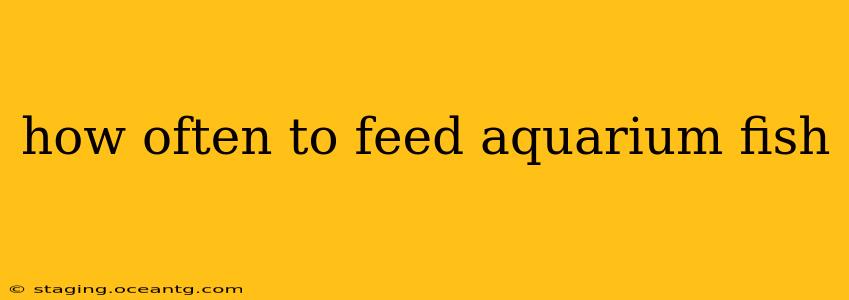Feeding your aquarium fish might seem simple, but getting the frequency right is crucial for their health and the overall well-being of your tank. Overfeeding leads to water quality issues, while underfeeding can result in malnutrition and weakened fish. This comprehensive guide will help you determine the optimal feeding schedule for your aquatic companions.
How Much and How Often Should I Feed My Aquarium Fish?
The golden rule is to feed your fish only what they can consume in 2-3 minutes. This prevents uneaten food from decaying in the tank, leading to harmful ammonia and nitrite buildup. The frequency depends largely on the type of fish and their size.
- Small, active fish: These often need to be fed 2-3 times a day, offering small amounts each time. Think of smaller tetras, rasboras, or similar species.
- Larger, less active fish: These may only need feeding once a day, or even every other day, depending on their size and metabolism. Larger cichlids or goldfish fall into this category.
- Juveniles: Young fish generally require more frequent feedings, as they grow rapidly and need more energy. You might feed them several small meals daily.
What Type of Food Should I Feed My Aquarium Fish?
The type of food also influences feeding frequency. Different foods digest at different rates:
- Flake food: A staple for many fish, flake food is convenient but can often be overfed. A good quality flake food is a great base but should be supplemented with other options.
- Pellet food: Similar to flakes, but often sink to the bottom, beneficial for bottom-dwelling fish. Like flakes, it should be part of a varied diet.
- Live food (e.g., bloodworms, daphnia): These are excellent supplemental foods, providing essential nutrients and encouraging natural foraging behavior. However, overuse can introduce parasites and pollute the tank quickly. Use sparingly and in moderation.
- Frozen food (e.g., bloodworms, brine shrimp): A convenient alternative to live food, offering similar nutritional benefits with less risk of contamination.
- Vegetable matter: Many fish, especially herbivores and omnivores, need plant-based food. Blanched vegetables like spinach, zucchini, and peas can be offered.
A varied diet, including a combination of the above, is best for a healthy and happy aquarium.
What Happens if I Overfeed My Fish?
Overfeeding has several negative consequences:
- Water quality deterioration: Uneaten food decomposes, raising ammonia and nitrite levels, leading to toxic conditions for your fish.
- Obesity and health problems: Just like humans, overfed fish become obese, which increases their susceptibility to diseases.
- Increased algae growth: Excess food provides nutrients for algae, causing unsightly blooms.
What Happens if I Underfeed My Fish?
Underfeeding is also detrimental:
- Malnutrition: Fish become deficient in essential nutrients, leading to stunted growth, weakened immune systems, and increased vulnerability to diseases.
- Aggression: Hungry fish become more aggressive, potentially harming tank mates.
- Slow growth: Young fish particularly suffer from stunted growth due to a lack of nutrition.
How Do I Know If My Fish Are Getting Enough Food?
Observe your fish closely:
- Active and alert: Healthy, well-fed fish are active, inquisitive, and show a healthy appetite.
- Bright colours and scales: A dull appearance can signal malnutrition.
- Healthy waste production: Regular, firm waste indicates good digestion.
- Growth: Juveniles should exhibit steady growth.
If you notice any signs of malnutrition or poor health, adjust the feeding schedule and possibly the type of food offered.
What About Fasting My Aquarium Fish?
Occasional fasting (1-2 days per week) can be beneficial. It allows the fish's digestive system to rest and can improve water quality. However, this shouldn't replace a balanced feeding schedule and is not suitable for all fish, especially juveniles or those already experiencing health issues.
How Often Should I Feed My Fish Different Types of Food?
There isn't a single answer, as the ideal mix depends on your fish's species and dietary requirements. However, a good rule of thumb is to incorporate a variety of foods into their diet. For example, you might feed flake food daily, then supplement with frozen or live food twice a week, and vegetables once or twice a week. Always prioritize quality over quantity.
Remember, responsible fishkeeping involves careful observation and a willingness to adjust your approach based on your fish's needs. By following these guidelines, you can help ensure your aquarium thrives and that your fish live long, healthy lives.
